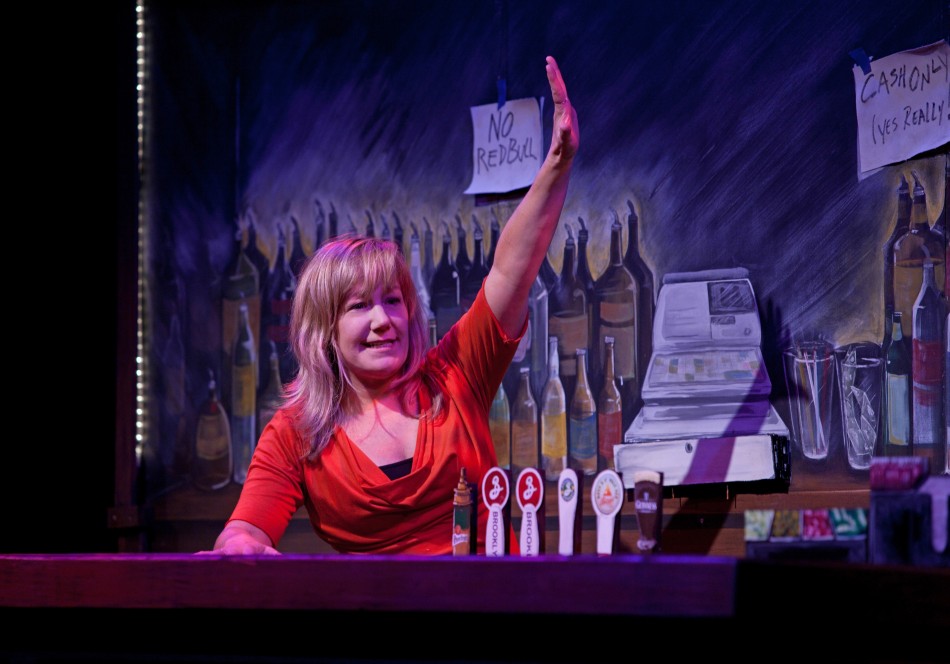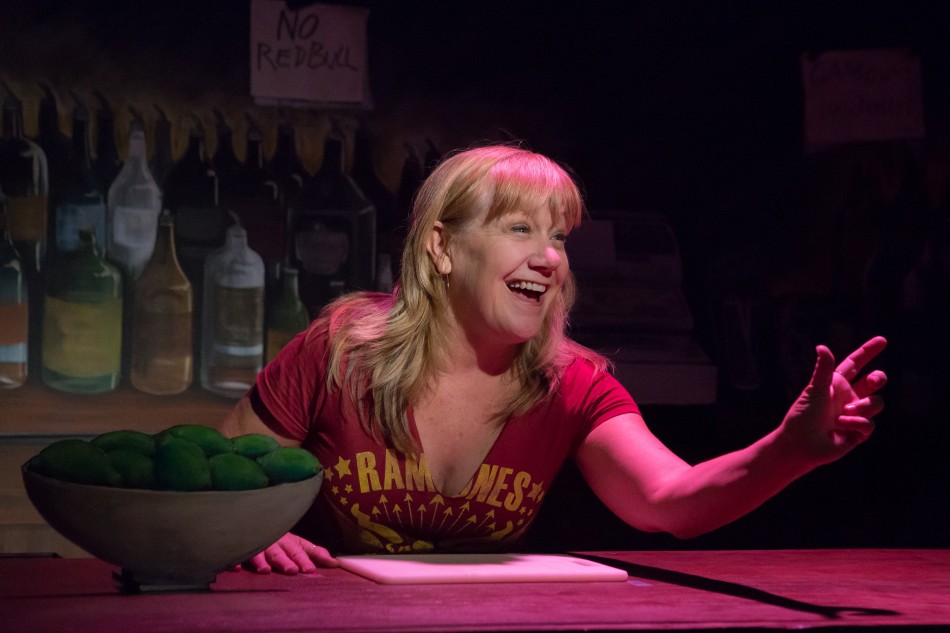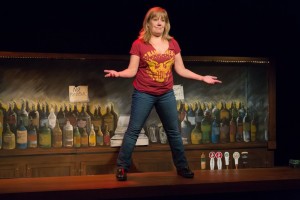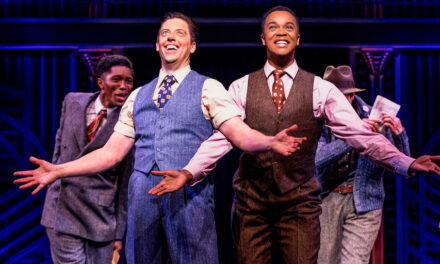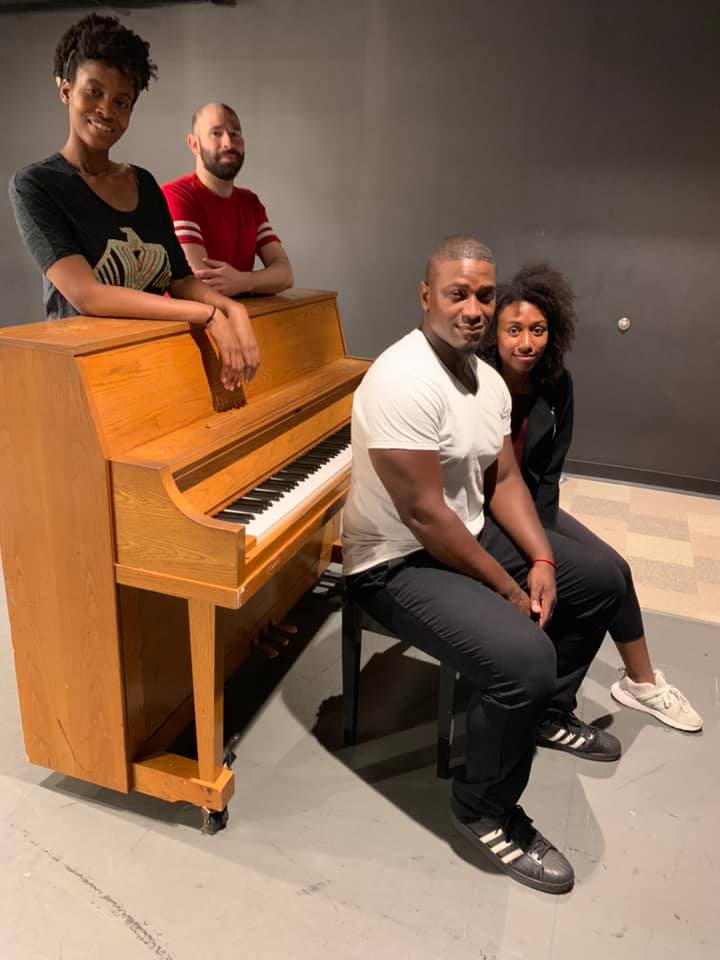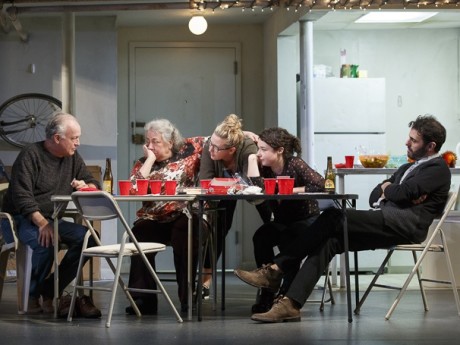by JK Clarke
Anyone who has spent time in a NYC dive bar, particularly in Greenwich Village, recognizes Terri Girvin. She’s a brassy, no-nonsense young woman whose regard vacillates between tender and tough-as-nails, as circumstance dictates. Women like Terri are almost as numerous as the bars that contain them. Unique as they all may be, we know them when we see them. And each one seems like she might have a story to tell, one that a bar regular gets to hear in bits in pieces over weeks, months and years. Terri Girvin tells her version of this story in just an hour and a half in Last Call (presented by terraNOVA Collective) at the IRT Theater through November 1.
We first meet Terri as she plays her mother Gwen, a chirpy, brightly-colored, raggedy-ann clown on rollerskates singing “Zippidy Doo Dah!” She tells us, “this is the best day of your life . . . your funnest day ever because I believe the world needs more fun.” In a voiceover, Terri deadpans, “So, this is my mother in 1970 . . . just a normal day.” We understand most of what we need to know right then and there.
Last Call tells two stories. First is the outer wrapper, a story of a New York City bartender and her daily experiences of charm and sadness in an everyman sort of bar. We witness the sad regular, the strange and disturbing occasional walk-in (who visits the bar only to use the restroom for a “number two” – ugh), and the narcissistic lout. And in this age of privilege and entitlement, there exists no more lout-filled establishment than a New York City bar. Any bartender will quickly recite a list of pet peeves: from the complicated drink order on a crowded night to the guy who waves his money, demanding attention and the right to be served ahead of everyone else. Garvin relates these annoyances real time. As she tells her story, she deals with almost every imaginable scenario one might encounter in her establishment. These scenarios might be insightful to the teetotaler or out-of-towner, but for a local, particularly someone likely to see this show, they’re merely well known and established truths. But it’s the in-between story, which comes out in bits, with phone calls from her panicked, homeless mother or childhood anecdotes that start to unmask the woman behind the bar, so diligently and compulsively slicing limes and precisely aligning the bills in her cash register.
What emerges is a story of the damage caused to a daughter by a parent seemingly mired forever in childhood. Terri’s mother is like Ruth Gordon’s tragi-comic character in Harold and Maude, who cares not for rules or for the damage done to others by flaunting those rules, wallowing in the deluded notion of a carefree life. As a consequence, young Terri is forced to be her caretaker, a lifelong role she is in the midst of trying to flee as she speaks to us. It is precisely this that makes Last Call an intriguing and touching story. For, while Terri undertakes the monotonous bar work she so desperately craves as a refuge from the anarchy that was her childhood, we see her struggling to hang on as it appears the tranquility the job offers her might be shattered once again by her mother’s presence.
Girvin’s very convincing timing and often humorous story, directed by Michael Leeds, is nicely augmented by a soundscape of voices, past memories and bar atmosphere by Phil Palazzolo. Not only does she provide an insightful view, for the uninitiated, into NYC bar culture, but more importantly into the soul of someone, like so many of us, trying to find a small slice of peace and order in a chaotic life.
Last Call. Through November 1 at the IRT Theater, 154 Christopher Street (between Greenwich and Washington Streets, West Village, NYC). www.terranovacollective.org
* Photos by Hunter Canning


